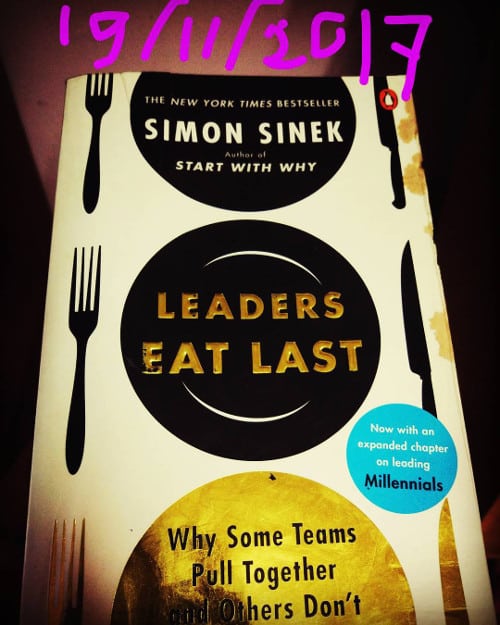I bought this book about 2-months ago, and it took me a while to finish reading it.
Here is my take on the content presented by Simon in his book “Leaders eat last”.
There are 4 main chemicals highlighted in defining what have crucial impact on our social behavior and emotional state.
According to Simon, there are four primary chemicals in our body that contribute to all our positive feelings that we generically known as “happy”:
- endorphins
- dopamine
- serotonin
- oxytoxin
At which endorphins and Dopamine make us to perseverance, find food foods, build shelters, invent tools, drive forward and get thing done.
While Serotonin allow us to work together, develop the feeling of trust and loyalty, help strengthen our social bond, work together and cooperates.
All four are essential to be balanced, so that we can ultimately SURVIVE and ENSURE our legacy will LIVE on beyond us.

Have you ever experience of the feeling that feels good when you had put in a lot of effort to accomplish something.
That is the proof that there is no biological incentive to do nothing.
Simon went on explaining all above chemicals and its effect in very great details in this book.
And also put into readers perspective why it is important to us as leaders, as a father or mother of growing kids.
He goes on and touch something about being the “Alpha” of the group.
Those who work hardest to help others succeed will be seen by the group as the leader or the “alpha” of the group.
And being the alpha — the strong, supportive one of the group, the one willing to sacrifice time and energy so that others may gain — is PRE-requisite for LEADERSHIP.
I love the way Simon explaining his argument in this book because it was presented in a a very thorough with fact and relevant historical fact (you may find it too much of this stats to support his argument :)).
On the millenials issues:
I believe many of us may have at least once encountered or read about the complaint made by employer regarding their millenials ( those who grow at the beginning of the new millenium) trait that may seem overly attached to social-media and demanding a way too much for salary.
On top of that, they may also seems as impatient and wouldn’t hesitate to call it a quit whenever they don’t like to work at the company. Even if there is no another job secured at the time.
Simon presented a very interesting argument for both side,
and I learn so much insight from this book.
and one story stick in my head is the following:
Imagine you are now flying at 35,000 feet above the ground.
In an well maintained aircraft, with experienced cabin crew.
And the aircraft is controlled by an experienced pilot with huge amount of flying time, and very capable to bring you to the destination safely.
However, there is one external crucial part to make this journey a success is the “Air Traffic Controller” at each airspace that will give specific instruction and command to a fleet of flight in his/her area.
Just imagine, after the air traffic controller is giving our pilot the direction for the 15-minutes coordinate with flight level and everything. He then switch to his mobile phone and checking his messages, and then giving coordinate and direction to next flight. And checking his phone again in between of doing this task.
Would you still feel safe?
I bet most of us would think this is unacceptable.
A lot of thing can go wrong when we’re NOT fully FOCUS on our job when we are on-duty.
And that is why there is regulation enforced for air traffic controller not the bring along his/her personal mobile device into control room.
How about other areas of our professional working environment.
Did we imply the above measure to ensure we’re focused on what being assigned to us to be delivered?
And while this may too extreme us when it come to life & death scenario as all the above pilot depend solely on air traffic controller to which it wouldn’t able to tolerate the slightest mistake. But that is what we are paid to do when our employer agreed to pay our monthly salary.
It demand our commitment at least during when we “on the duty”.
And I think Simon did a great job explaining this in very detail, how this related back to when parenting treats their children while they’re growing up. Eventually its all contribute to what we are facing today.
And to my least expectation, there is a checklist of what we can do to improve the above situation.
Both for millenials and also for parent, for employers..
Last and not least, I think this book inspired me as parent to ensure my kids and those under my care to be prepared on what’s next.
With that, hope this will give at least some insight on what to expect in this great book.

Please add in comment if you feel like to add anything to above issue.
Thank you.

